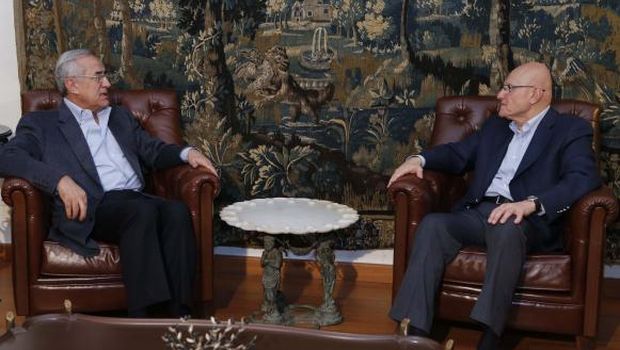It is ingrained in the Lebanese psyche that everything that happens in the country must be the result of some foreign desire or will. The formation of the government is no exception to this rule.
Indeed, foreign factors affect the course of Lebanese life, especially the previous Syrian interventions and the current Iranian ones, so they should certainly not be overlooked or ignored. These interventions prevented the restoration of Lebanese sovereignty and independence, denied the people’s free choice, and reduced Lebanon to nothing more than a ‘mailbox,’ a feeble state free for the taking by Tehran. However, at the same time, it is impossible to connect all internal political movements with foreign factors since external elements often intersect with internal ones. This makes it easier to assign merit, especially if at any given moment Iran does not pay any attention to Lebanon, and its priorities are instead confined to a specific issue—such as the nuclear—which pushes Lebanon further down its agenda.
The foreign concern is focused today on one obvious objective: to maintain stability, or at the very least, to prevent any expansion of the Syrian crisis into Lebanon. Thus, there is no problem for the international community even if Lebanon is handed over to Hezbollah. The position of former President Najib Mikati’s government is the best example of that. It is ready to cover any domestic initiative that contributes to the cooling of the Lebanese crisis.
In this sense, four domestic factors, which intersect with foreign motives and influences, comprise the fuel for the recent developments.
First, Hezbollah needed domestic Sunni cover to counter the “Takfirist” threat it faced after its involvement in the fighting in Syria. The failure of all its security measures in response to the terrorist bombings puzzled the organization and caused tension. The rising sectarian mobilization pushed Hezbollah to look for an option that kept its fighters in Syria and provided it with protection in Lebanon through its cooperation with the moderate Sunni bloc in combating terrorism. It rushed to rescind the “red lines,” which it drew, such as rejection of any government involvement in the “8+8+8” (eight ministers from the March 8 and March 14 alliances and affiliates of the President and Prime Minister Walid Jumblatt). Thus, Hezbollah’s retreat from the negotiating ceiling has opened the door for the start of negotiations and the birth of the government, which holds Hezbollah responsible for paralyzing the country for more than ten months.
It is worth noting that the bombings that targeted Hezbollah strongholds are directly linked to its fighting in Syria, and the vain search for security solutions or nationalist Sunni insurance umbrellas fail to address the actual reasons for these attacks. Despite the close attention that the Future Movement and the March 14 Alliance paid to every drop of blood that fell, the interests of the Lebanese people lie in getting Hezbollah out of Syria. It should be discouraged from getting involved when it doesn’t have a horse in the race and when its intervention can do nothing but damage its credibility and hurt its popularity.
The second factor was the Future Movement’s need to remove President Najib Mikati, who arrived in the Grand Palace courtesy of Hezbollah, especially because a vacuum in the presidency could allow Mikati to reappear, in a position linked to the transfer of presidential powers to the Council of Ministers, and claim the position of sole head of the executive branch. Along the same lines, the Future Movement’s fear of rising extremism on the Sunni street should not be underestimated; it is reinforced by scenes of Syrian blood and the targeting of Sunnis in Lebanon. Over time, the Future Movement lost sight of its audience, especially given Prime Minister Saad Al-Hariri’s presence overseas, the absence of political money, and his staying out of power. It remains an important factor also in the failure to produce serious opposition and a real peaceful civil resistance in the face of Hezbollah, as well as the Future Movement itself, which in its very nature, does not see itself out of power.
Thirdly, and perhaps most importantly, the 3 billion US dollar ‘gift’ from Saudi Arabia for the Lebanese army to buy weapons from France has pushed the latter to take action. It is attempting to initialize the government contract in order to facilitate the monetization of the gift, which requires that the new government be active. In spite of its tough stance against Tehran and its position as regional bulwark against Iranian expansion in the Arab world, Riyadh deferred the issue of Hezbollah’s participation in the government to the Lebanese people who, in Riyadh’s opinion, can better understand and appreciate the interests of their country.
Fourth, in regards to Washington, it does not give any importance to the Lebanese issue. Its only concern at this stage is to prevent the spillover of chaos from Syria to Lebanon so as not to threaten the security of Israel and turn the Syrian crisis into a regional war. This is why they take solace in the settlement of the government.
In conclusion, all the domestic and foreign forces rely on the policy of buying time, waiting for the crystallization of Iranian and Syrian situations. But there is no doubt that, this time, the domestic factors overshadowed the foreign factors. Domestic factors contributed to reaching a compromise at the government level, while foreign factors were merely catalysts and incubators for the domestic desires or interests.
The counterpoint to this piece can be read here
